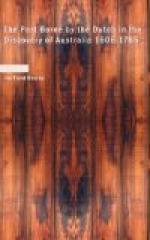On the 15th do. in the morning we were near a point of the coast off which a large reef extended about a mile in length, we ran in between the land and this reef, which we estimated to be in 23 deg. Lat., and thus sailed along the coast, along which there was another reef, inside which the water seemed to be very smooth and still; we did our best to get inside this second reef, but did not find an opening before noon, when we saw a passage where there was no surf, we ran into it, but found it to be full of stones, and sometimes no more than one or two feet deep.
This coast had a foreshore covered with dunes about a mile in width, before you come to the higher part. We therefore began to dig in divers places, but the water proved to be salt; some of us went to the higher land, where by good luck we found in a rock a number of cavities, in which a quantity of rain-water had collected. It also seemed that a short time before there had been natives there, for we found some crab-shells lying about and here and there fire-ashes. Here we somewhat quenched our cruel thirst, which almost prevented us from dragging ourselves along, for since the loss of our ship we had had no more than one or two mutchkins daily, without any wine or other drink. Besides quenching our own thirst, we here gathered about 80 cans of water, and remained there for the night.
On the 16th do. in the morning we continued our exploration in order to find out whether there were more water-pits in the mountains, but our search was fruitless, for it seemed not to have rained there for a long time past, and we found no traces of running water, the higher ground being again very barren and unpromising, without any trees, shrubs or grass, but with plenty of high ant-hills in all directions. These ant~hills consisted of earth thrown up, and from afar somewhat resembled huts for the abode of men.




